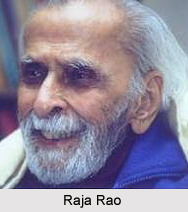 `Comrade Kirillov` by Raja Rao is a famous book. The title of the story reflects the name of central character of the story. The story is on the version of this person. The name aptly depicts the title of the story.
`Comrade Kirillov` by Raja Rao is a famous book. The title of the story reflects the name of central character of the story. The story is on the version of this person. The name aptly depicts the title of the story.
The famous Indian writer Raja Rao used to believe in Gandhian policies. Rao returned to the theme of Gandhism in one of his short story collection. In 1998 he published Gandhi`s biography in his language. After the war, Rao spent much of his time in France and travelling throughout the world. He visited America in 1950 and later spent some more time living in an ashram. As he was divorced in 1965 he married an actress, Katherine Jones. From 1965 to 1983 Rao lectured on Indian philosophy at the University of Texas at Austin. He retired from that institution in 1980. His second marriage ended in divorce and after that he marrie Susan Vaught in 1986. In 1988 he received the prestigious Neustadt International Prize for Literature. In 1997 he received the Sahitya Academi fellowship, India`s highest literacy award. He was attached to India and though he was settled in Austin he made it a point to come back to India and go to the Himalaya. He had connectivity with spirituality in his real life as well as fiction-life. As a whole Raja Rao was a person with excellent writing power and lots of humour lying in him.
Synopsis:
`Comrade Kirillov` is a sketch of a South Indian man named Padmanabha Iyer. the book is an exploration of this manifestation in modern man. An Indian who ventured abroad when still young, Kirillov came to England in 1928 and settled there. He is a seeker, and taken from the first by Marxism. Kirillov can excuse and justify the show-trials, while at the same time denigrating Mahatma Gandhi and his efforts in India. The novella covers the 1930s and 1940s, to Indian independence and beyond. As the narrator recognises, Kirillov is torn between the Indian tradition that remains a part of him and the newfound ideology that he has embraced. Indeed, even as he claims to be what amounts to the Soviet ideal, he sounds like nothing so much as the ascetics of his homeland. Kirillov eventually returns to India. At the end the author offering a chunk of the diary of Kirillov`s wife, Irene, before the conclusion. It is the next generation, Kirillov`s son Kamal, that is then the focus at the end, the author giving up on Kirillov. Kamal, soon immersed in his past, offers hope for the future, while Kirillov is lost down this path he can not escape from, obsessed like the religious fanatic.
Published by Ind-us publication `Comrade Kirillov` is a unique creation of Raja Rao which is complicated to the readers at times.
`Comrade Kirillov` by Raja Rao is a good writer. This is a sketchy book of his treasure. This story of Rao offers a fill of life and ideology in quick, fine brushstrokes. There`s much that could have been filled out and told in greater detail, but the almost flighty approach is a convincing reflection of Kirillov`s own torn personality, his own uncertainty and the tug between India and Communism very effectively conveyed in the novel. It is also an interesting novel of the Indian expatriate experience in the 1930s where it gives the reader about a general viewpoint about the whole story.



















